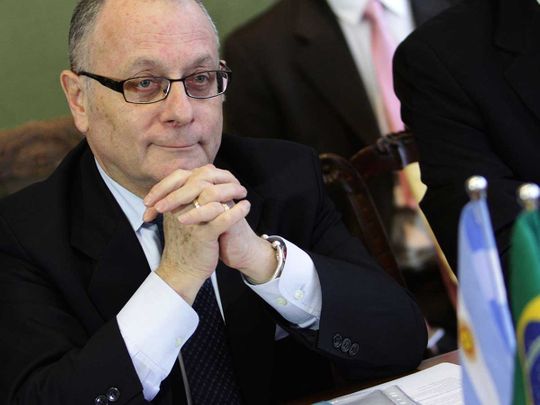
Europe and South America's leading customs union struck a free-trade deal after 20 years of talks, notching up a major win in a global market-opening drive that counters the protectionism of US President Donald Trump.
Top European Union officials reached a breakthrough in free-trade negotiations with counterparts from the Mercosur group of Argentina, Brazil, Paraguay and Uruguay, paving the way for an agreement to expand goods shipments worth almost 90 billion euros ($102 billion) a year. The pact is slated to be among the EU's biggest.
Both sides settled longstanding differences over Mercosur demands for greater access to the EU agricultural market, including for beef and sugar, and European calls for South America to lower automotive-import barriers.
Bringing to an end two decades of talks, the deal struck on Friday in Brussels follows groundbreaking European free-trade accords with Canada and Japan and adds political momentum to EU negotiations with Australia and New Zealand. It comes as government heads from the Group of 20 leading economies meet in Japan with the focus on Trump's trade war with China and planned meeting on Saturday with his Chinese counterpart.
Europe is fighting to uphold a 70-year-old global commercial order threatened by Trump's "America First" agenda, which has sparked US tariff battles against strategic allies and rivals alike, rattled the foundations of the World Trade Organization and darkened the economic outlook.
The EU, the world's largest trading bloc with more than 500 million consumers, is also seeking to underscore its commercial clout as the UK prepares to leave by October 31. While Brexit will force Britain to take charge of its own trade policy for the first time in almost 50 years, the country hopes to piggyback on the market-opening pacts already struck by the EU.
Latin Celebrations
The deal is the largest and most complex ever struck by Mercosur and South American governments were quick to celebrate its signing.
"Together, Mercosur and the EU represent a quarter of the global economy and now Brazilian producers will have access to this enormous market," Brazilian President Jair Bolsonaro wrote on Twitter. "Great day!"
A press statement released by the Brazilian economy ministry said that the deal would result in an increase in GDP of $87.5 billion over the next 15 years, a number that could rise to $125 billion.
'The Mercosur-EU deal is much more than a trade agreement,' said Argentine Foreign Affairs Minister Jorge Faurie. 'It's a strategic advance in Argentina's position on the global stage that strengthens the commercial agenda of both our country and our bloc.'
Key facts about the blockbuster EU-Mercosur trade deal
Taking into account the GDP of all the countries concerned, the agreement concluded by the EU in 2018 with Japan is slightly larger (19.5 trillion euros) than that with Mercosur (18 trillion euros).
But in terms of population, the EU-Mercosur agreement is bigger, involving 770 million people, ahead of the EU-Japan's deal covering 630 million.
The EU and Mercosur exchange 88 billion euros in goods annually, with a balance very slightly in favour of the Europeans (+2.5 billion euros).
These exchanges place Mercosur between India and Canada, in 10th place among the EU's main trading partners.
But the trade remains modest compared with the 675 billion euros exchanged each year by Europeans with the United States, their main partner.
The EU is Mercosur's largest trading partner after China.
Advantages
The agreement is set to eliminate South American tariffs against the EU that are still very high in some key industrial sectors: 35 percent in the clothing and automotive sector - which are at the heart of the agreement - or 14 percent in the pharmaceutical industry.
In agriculture, these customs duties are now high for spirits (35 percent), dairy products (28 percent), chocolate (20 percent) or wine (20 percent).
The agreement also aims to protect European geographical indications on products such as Cognac or Manchego cheese. These goods often exist in the Americas because of historical links between the two regions.
The EU is also counting on the agreement to improve access to the South American market for services (telecommunications, transport or financial services).
EU concessions
The EU will have to open its market to beef, ethanol, sugar and poultry exports from the Mercosur nations - these are all crucial sectors for the South Americans, but also very sensitive for European producers who have strongly opposed the trade deal.
To protect its market, the EU is setting up quotas: politically sensitive imports will not be taxed when they arrive in Europe up to a certain threshold, above which customs duties will again be applied.
These quota thresholds were also imposed on Canada and Japan.
Environment
Like all the agreements recently signed by the EU, this one includes a chapter on sustainable development.
According to the commission, this chapter will cover areas such as "forest conservation, wildlife trade and respect for workers' rights".
Despite these non-binding commitments, several NGOs have expressed concern, particularly because of the "ecological situation in Brazil" since the inauguration in January of far-right President Jair Bolsonaro.
Bolsonaro is pursuing a policy that favours agribusiness, a major business in his country's economy, but which, according to activists is destroying the Amazonian forest.
Unknowns
The agreement negotiated by the commission with Mercosur must now be approved by all 28 member states, which is not an easy task in Europe, where public opinion increasingly questions the benefits of free trade and its impact on the climate, even in traditionally trade-friendly countries.
In 2016, Belgium alone almost ruined the signing of the highly controversial CETA trade agreement with Canada. But the desire to make the EU a champion of free trade against US President Donald Trump-led protectionism could work in favour of the deal.
If so, the accord will then have to be validated by a vote in the European Parliament.








